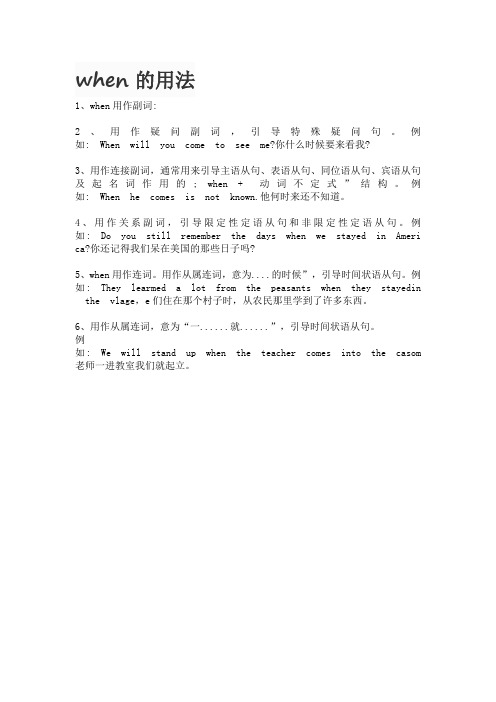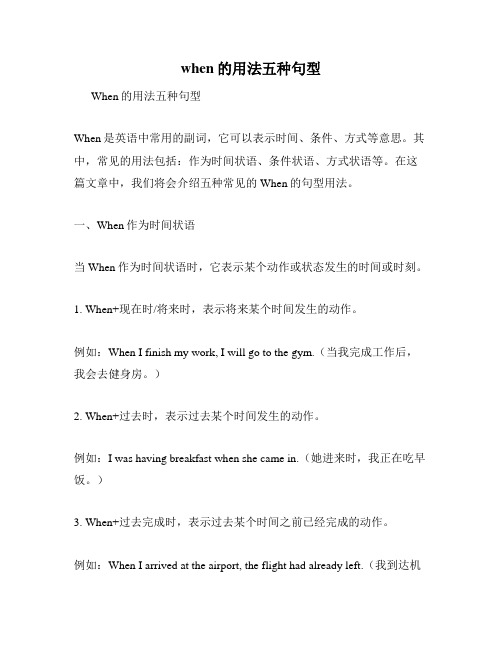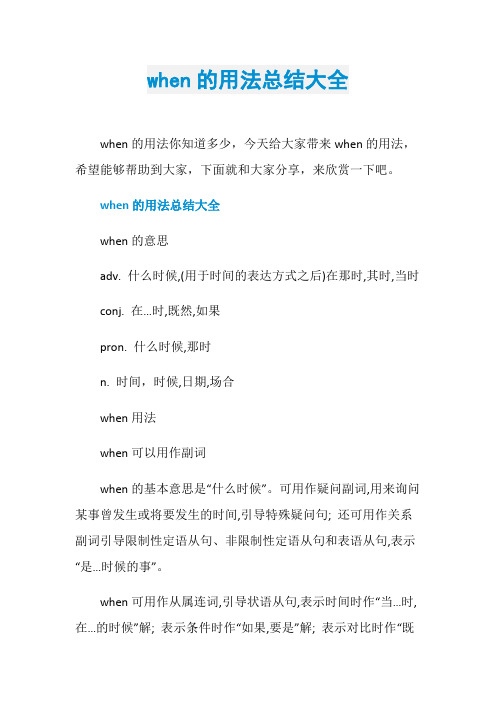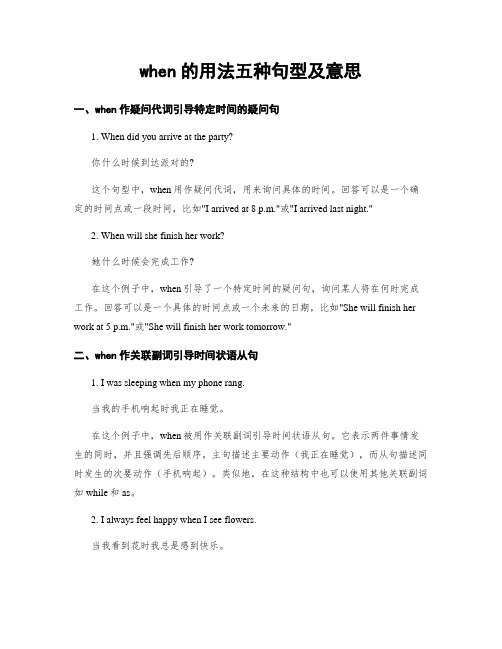When的用法小结
when的用法

when的用法
1、when用作副词:
2、用作疑问副词,引导特殊疑问句。
例如: When will you come to see me?你什么时候要来看我?
3、用作连接副词,通常用来引导主语从句、表语从句、同位语从句、宾语从句及起名词作用的; when + 动词不定式”结构。
例如: When he comes is not known.他何时来还不知道。
4、用作关系副词,引导限定性定语从句和非限定性定语从句。
例如: Do you still remember the days when we stayed in Ameri ca?你还记得我们呆在美国的那些日子吗?
5、when用作连词。
用作从属连词,意为....的时候”,引导时间状语从句。
例如: They learmed a lot from the peasants when they stayedin the vlage,e们住在那个村子时,从农民那里学到了许多东西。
6、用作从属连词,意为“一......就......”,引导时间状语从句。
例
如: We will stand up when the teacher comes into the casom 老师一进教室我们就起立。
when的用法五种句型

when的用法五种句型When的用法五种句型When是英语中常用的副词,它可以表示时间、条件、方式等意思。
其中,常见的用法包括:作为时间状语、条件状语、方式状语等。
在这篇文章中,我们将会介绍五种常见的When的句型用法。
一、When作为时间状语当When作为时间状语时,它表示某个动作或状态发生的时间或时刻。
1. When+现在时/将来时,表示将来某个时间发生的动作。
例如:When I finish my work, I will go to the gym.(当我完成工作后,我会去健身房。
)2. When+过去时,表示过去某个时间发生的动作。
例如:I was having breakfast when she came in.(她进来时,我正在吃早饭。
)3. When+过去完成时,表示过去某个时间之前已经完成的动作。
例如:When I arrived at the airport, the flight had already left.(我到达机场时,飞机已经起飞了。
)二、When作为条件状语当When作为条件状语时,它表示某种条件下发生的结果。
4. When+现在时/将来时,表示将来某个条件下发生的结果。
例如:When you have finished the project, you can take a break.(当你完成这个项目后,你可以休息一下。
)5. When+过去时,表示过去某个条件下发生的结果。
例如:When I was young, I used to play baseball with my friends.(当我年轻时,我经常和朋友们一起打棒球。
)总结从以上例句可以看出,When作为时间状语和条件状语时,都是用来表示动作发生的时间或状态,只是表达方式不同。
当使用时需要根据语境进行判断。
在实际生活和工作中,When的用法非常常见,掌握好这五种句型用法,能够让我们在英语交流中更加准确、清晰地表达自己的意思。
when的用法总结大全

when的用法总结大全when的用法你知道多少,今天给大家带来when的用法,希望能够帮助到大家,下面就和大家分享,来欣赏一下吧。
when的用法总结大全when的意思adv. 什么时候,(用于时间的表达方式之后)在那时,其时,当时conj. 在…时,既然,如果pron. 什么时候,那时n. 时间,时候,日期,场合when用法when可以用作副词when的基本意思是“什么时候”。
可用作疑问副词,用来询问某事曾发生或将要发生的时间,引导特殊疑问句; 还可用作关系副词引导限制性定语从句、非限制性定语从句和表语从句,表示“是…时候的事”。
when可用作从属连词,引导状语从句,表示时间时作“当…时,在…的时候”解; 表示条件时作“如果,要是”解; 表示对比时作“既然,考虑到”解。
当when所引导的从句的主语和主句的主语一致时,常将其主语、系动词或助动词省去,只留实义动词或表语,或者改写为短语。
when所引导的时间状语从句用一般现在时代替将来时,用现在完成时代替将来完成时。
when用作副词的用法例句When did that happen?那件事是什么时候发生的?They stood respectfully when he entered the room.当他走进房间时,他们都恭恭敬敬地站着。
Iron will melt when it is made very hot.当铁烧得很热时就会熔化的。
when可以用作连词when可用作从属连词,引导状语从句,表示时间时作“当…时,在…的时候”解; 表示条件时作“如果,要是”解; 表示对比时作“既然,考虑到”解。
当when所引导的从句的主语和主句的主语一致时,常将其主语、系动词或助动词省去,只留实义动词或表语,或者改写为短语。
when所引导的时间状语从句用一般现在时代替将来时,用现在完成时代替将来完成时。
when用作连词的用法例句And they roared when Seaman held up two fingers.然后当希曼伸出两根指头的时候他们就吼叫起来。
when的用法归纳总结

when的用法归纳总结当我们学习英语时,经常会遇到when这个词。
它有多种用法,下面是对when的用法进行归纳总结。
1. 当引导时间状语从句时,表示一个具体的时间点或时间段。
例如:I usually go to bed at 10 p.m. when I have work the next day.(每当我第二天有工作时,我通常在晚上10点上床睡觉。
)2. 当引导条件状语从句时,表示假设或条件。
例如:I will go to the park when it stops raining.(当雨停下来时,我会去公园。
)3. 当引导原因状语从句时,表示某个事件或情况发生的原因。
例如:He was late for the meeting when his car broke down.(他的车抛锚了,所以他开会迟到了。
)4. 当引导让步状语从句时,表示尽管有某种情况或条件,但仍然会发生另外一件事情。
例如:I will go out for a walk when it's raining, even though I don't like getting wet.(尽管我不喜欢淋雨,但下雨时我会出去散步。
)5. 当引导方式状语从句时,表示某件事情发生的方式或方式。
例如:She smiled when she saw her old friend.(她看到老朋友时微笑了。
)6. 当引导地点状语从句时,表示某件事情发生的地点。
例如:I will meet you at the café when I arrive in town.(我到镇上时会和你在咖啡馆见面。
)7. 当引导目的状语从句时,表示某个动作的目的。
例如:I bought a new laptop when I started my new job.(当我开始新的工作时,我买了一台新的笔记本电脑。
)总结:当可以用来引导时间、条件、原因、让步、方式、地点和目的状语从句。
when询问时间的用法及例句

when询问时间的用法及例句"When" 是一个疑问副词,用于询问时间。
以下是其用法和例句:基本用法:"When" 可以用来询问某个动作发生的时间,例如:When did you go to the party? (你什么时候去参加派对的?)也可以用来询问某个事件发生的时间,例如:When did the earthquake happen? (地震是什么时候发生的?)回答方式:回答时可以使用时间点(如具体日期、时间等),例如:I went to the party on Sunday. (我星期天去参加派对的。
)也可以使用时间段(如几天、几周、几个月等),例如:I will go to the party in a few days. (我几天后去参加派对。
)其他用法:"When" 还可以用于描述未来的时间安排,例如:When will you finish your work? (你什么时候完成工作?)在某些情况下,"when" 可以用于描述过去的情况,例如:I remember when we first met. (我记得我们第一次见面的时候。
)注意,"when" 在某些情况下可能会与 "what time" 混淆。
但 "when" 更强调时间点或时间段,而 "what time" 更强调具体的时间点。
例如,"What time did you go to bed?" (你几点睡觉的?)更强调具体的时间点,而"When did you go to bed?" (你什么时候睡觉的?)则更强调时间段。
when 的用法

when 的用法一、基本用法When 是英语中常见的时间连接词,用于引导时间状语从句或条件从句。
它可以表示时间,在这种情况下通常与一般过去时连用;还可以表示条件,这时常与一般现在时或一般将来时连用。
当我们使用 when 时,要注意以下几个方面。
1. 当 when 引导时间状语从句时,主句和从句的动作在时间上是先后发生的关系。
例如:- I was watching TV when he called me.(他给我打电话的时候,我正在看电视。
)- When the guests arrived, the party had already started.(客人们到达时,聚会已经开始了。
)2. 当 when 引导条件从句时,主句和从句的动作在逻辑上是因果关系。
例如:- When you study hard, you will pass the exam.(当你努力学习时,你会通过考试。
)- When it rains, I prefer to stay at home.(下雨天我更愿意待在家里。
)二、特殊结构与搭配1. 使用虚拟语气:当主句表达的是虚拟条件或假设,并且从句中使用了具体过去时态,则在从句中使用 would/could/should/might + 动词原形。
例如:- If I were you, I would call him when I need help.(如果我是你,需要帮助的时候我会给他打电话。
)2. 使用连词关联从句:在 when 引导的时间状语从句中,可以与一些特定的连词搭配使用,使句子更加丰富多样。
例如:- You will find it easier when you get used to it.(当你习惯了它,你会发现它更容易。
)- He was kind enough to help me just when I needed assistance.(当我需要帮助时,他非常友好地帮助了我。
when的用法总结大全

when的用法总结大全when的用法你知道多少,今日我给大家带来when的用法,盼望能够关心到大家,下面我就和大家共享,来观赏一下吧。
when的用法总结大全when的意思adv. 什么时候,(用于时间的表达方式之后)在那时,其时,当时conj. 在…时,既然,假如pron. 什么时候,那时n. 时间,时候,日期,场合when用法when可以用作副词when的基本意思是“什么时候”。
可用作疑问副词,用来询问某事曾发生或将要发生的时间,引导特别疑问句; 还可用作关系副词引导限制性定语从句、非限制性定语从句和表语从句,表示“是…时候的事”。
when可用作从属连词,引导状语从句,表示时间时作“当…时,在…的时候”解; 表示条件时作“假如,要是”解; 表示对比时作“既然,考虑到”解。
当when所引导的从句的主语和主句的主语全都时,常将其主语、系动词或助动词省去,只留实义动词或表语,或者改写为短语。
when所引导的时间状语从句用一般现在时代替将来时,用现在完成时代替将来完成时。
when用作副词的用法例句When did that happen?那件事是什么时候发生的?They stood respectfully when he entered the room.当他走进房间时,他们都恭尊敬敬地站着。
Iron will melt when it is made very hot.当铁烧得很热时就会熔化的。
when可以用作连词when可用作从属连词,引导状语从句,表示时间时作“当…时,在…的时候”解; 表示条件时作“假如,要是”解; 表示对比时作“既然,考虑到”解。
当when所引导的从句的主语和主句的主语全都时,常将其主语、系动词或助动词省去,只留实义动词或表语,或者改写为短语。
when所引导的时间状语从句用一般现在时代替将来时,用现在完成时代替将来完成时。
when用作连词的用法例句And they roared when Seaman held up two fingers.然后当希曼伸出两根指头的时候他们就吼叫起来。
when作为连词时的用法

when作为连词时的用法
1. “When”可以用来引导时间状语从句呀,就像“When I was a child, I loved playing in the garden.”你看,这多简单直接,一下子就表明了过去某个时候“我”的行为呢。
2. 嘿,“when”还能表示“就在这时”呢!比如说“Tom was walking on the street, when suddenly it started to rain.”,是不是感觉恰到好处地描述了一个场景呀?
3. 你难道不知道“when”能表达条件吗?比如“If you study hard when you are young, you will have a bright future.”,这就像是给未来一个承诺呀。
4. 有没有发现“when”连接的从句可以在主句之前哦,像“When he came home, I was cooking dinner.”,是不是很有趣?
5. “when”也能表示对比呢,好比“Some people like coffee when others prefer tea.”,这多形象地展示了不同人的喜好呀。
6. 哇哦,“When I think of that moment, I still feel excited.”,这里的“when”多有情感呀,能让我们轻易感受到那种兴奋呢。
7. 记住哦,“When you have a chance, don't miss it.”,这简直就是在提醒我们要抓住时机呀!
结论:“when”作为连词的用法真是多种多样呀,灵活运用它能让我们的表达更丰富生动呢!。
when的用法五种句型及意思

when的用法五种句型及意思一、when作疑问代词引导特定时间的疑问句1. When did you arrive at the party?你什么时候到达派对的?这个句型中,when用作疑问代词,用来询问具体的时间。
回答可以是一个确定的时间点或一段时间,比如"I arrived at 8 p.m."或"I arrived last night."2. When will she finish her work?她什么时候会完成工作?在这个例子中,when引导了一个特定时间的疑问句,询问某人将在何时完成工作。
回答可以是一个具体的时间点或一个未来的日期,比如"She will finish her work at 5 p.m."或"She will finish her work tomorrow."二、when作关联副词引导时间状语从句1. I was sleeping when my phone rang.当我的手机响起时我正在睡觉。
在这个例子中,when被用作关联副词引导时间状语从句。
它表示两件事情发生的同时,并且强调先后顺序。
主句描述主要动作(我正在睡觉),而从句描述同时发生的次要动作(手机响起)。
类似地,在这种结构中也可以使用其他关联副词如while和as。
2. I always feel happy when I see flowers.当我看到花时我总是感到快乐。
这个例子展示了when引导时间状语从句,描述在特定情况下发生的一般动作。
主句表达一个经常性的感觉,而从句则指明特定触发条件(看到花)。
在这种结构中,也可以使用其他关联副词如whenever和every time。
三、when作连词引导条件状语从句1. You will succeed when you work hard.当你努力工作时你会成功。
when的用法四种句型及意思

When是一个常用的英语单词,表示时间、条件、原因等。
它可以用于多种句型中,下面将介绍四种常见的用法及其意思。
一、When + 简单句这种句型中,when表示时间,意为“当……时”,后面接一个简单句,表示某个动作发生的时间。
例如:When I woke up this morning, it was already 8 o'clock.(当我今天早上醒来时,已经是8点了。
)二、When + 现在分词这种句型中,when表示条件,意为“当……的时候”,后面接现在分词,表示某个条件满足时另一个动作就会发生。
例如:When studying English, one should pay attention to pronunciation.(学习英语时,应该注意发音。
)三、When + 过去分词这种句型中,when表示原因,意为“由于……时”,后面接过去分词,表示某个动作的原因。
例如:When asked about his hobbies, he replied that he liked playing basketball.(当被问及他的爱好时,他回答说他喜欢打篮球。
)四、If + 主语 + were to + 动词原形,主语 + would + 动词原形这种句型中,when表示虚拟条件,意为“如果……的话”,后面接虚拟语气,表示假设的情况。
例如:If I were to win the lottery, I would travel around the world.(如果我中了彩票,我会环游世界。
)综上所述,when的用法很多,需要根据具体语境来选择正确的句型。
掌握好这些句型,可以帮助我们更好地理解和运用英语。
when 用法小结

when 用法小结When 是一个常见的英语词汇,用于表达时间、条件或原因。
它有多种用法,下面将对这些用法进行小结。
1. 表示时间的用法1.1 定义时间点当 When 用来表示特定的时间点时,通常配合具体的日期或者时间使用。
例如:- I was born in 1990 when the Berlin Wall finally fell.(当柏林墙终于倒塌时,我出生了。
)- When did you arrive at the airport?(你什么时候到达机场的?)1.2 表示一段时间当 When 用来表示一段时间时,可以与介词 for 或 during 搭配使用。
例如:- I will be away on a business trip for a week starting from tomorrow. When I'm away, please take care of my plants.(从明天开始,我将因出差离开一周时间。
我离开时,请照顾好我的植物。
)- He injured his leg during the soccer game when he collided with another player.(在他和另一个球员碰撞时,他受了腿部的伤。
)2. 表示条件的用法When 可以用来描述特定的条件或情况,并引导一个条件从句。
例如:- I'll go to the park when the weather gets better.(天气好转时,我会去公园。
)- Please inform me when you finish your report.(你完成报告时,请告诉我。
)3. 表示原因的用法当 When 用来表示原因时,常与 because 或 as 引导原因状语从句。
例如:- I couldn't sleep when I was thinking about the upcoming exam.(当我想着即将来临的考试时,我无法入睡。
when特殊疑问词的用法

when特殊疑问词的用法一、特殊疑问词“when”的基本用法特殊疑问词“when”是英语中常见的一个词,用于询问时间。
它可以用来询问具体的时间点或时间段,以及事件发生的时间顺序。
在句子中,通常位于句首,后面跟动词或者主语。
下面将详细介绍“when”在不同语境下的使用方法和注意事项。
二、询问具体时间点1. 询问具体日期当我们想要了解某个事件发生的具体日期时,可以使用“when”。
例如:“Whenis your birthday?”(你的生日是什么时候?)2. 询问具体小时如果想要知道某个活动几点开始或结束,我们可以使用“when”。
比如:“When does the meeting start?”(会议几点开始?)3. 询问季节或月份有时候我们可能需要询问某件事情在哪个季节或月份发生。
例如:“When does spring start in your country?”(在你们国家春天是什么时候开始的?)或者“When does the cherry blossom season begin in Japan?”(日本樱花季是什么时候开始的?)三、询问时间段1. 询问持续时间当我们想要知道某个活动、过程或状态持续了多久时,可以使用“when”。
例如:“When did the movie last?”(这部电影播放了多久?)2. 询问特定事件发生的时间段有时候我们可能想要询问某个事件在一天中的具体时间段。
例如:“When do you usually have breakfast?”(你通常什么时候吃早饭?)四、询问时间顺序1. 跟在句首提出问题当我们想要了解某个事件或行为在时间上的先后顺序时,可以用“when”作为引导词放在句首。
例如:“When did you arrive at the airport?”(你什么时候到达机场?)或者“When did she start studying English?”(她什么时候开始学英语的?)2. 特殊疑问词与连词联用“when”还经常与其他连词结合使用,以表达更复杂的时间关系。
when的用法

when的用法一、基本用法When是英语中常用的一个连接词,表示时间和条件。
它可以用作连词引导时间状语从句或条件从句,从而使得上下文之间产生关联。
当使用when时,需要注意其用法和句子结构。
1. 引导时间状语从句When 作为连词引导时间状语从句时,一般放在主句后面。
例如:- I usually go to bed when it gets dark.- We will have a picnic tomorrow when the weather is nice.2. 引导条件从句当when引导条件从句时,可以表示将来某个特定事件发生的情况。
例如:- When you finish your homework, we can go out and play.3. 在问句中的用法当when出现在问句中时,通常询问具体的时间或日期。
例如:- When is your birthday?- When did you arrive at the airport?二、when与其他词汇搭配的常见表达方式1. 当……时候用when表示某一特定的时间点或时间段。
例如:- She was sleeping when the phone rang.- I cannot eat spicy food, as my stomach hurts when I do.2. 每当……就……当某个事件发生时,紧接着会做出相应的反应。
例如:- Every time he watches a sad movie, he cries.- Whenever I hear that song, it brings back memories of my childhood.三、常见表达方式的一些例句1. 引导时间状语从句- I will call you when I arrive at the hotel.- When the sun sets, the stars begin to appear in the sky.- He always gets a headache when he spends too much time on his computer.2. 引导条件从句- You can have dessert when you finish your vegetables.- When it rains, people often stay indoors to avoid getting wet.- We can go for a walk in the park when the weather improves.3. 搭配词汇"every time"和"whenever"- Every time I see her, she is always smiling.- Whenever I visit my grandparents, they prepare a delicious meal for me.四、常见错误用法及纠正1.错误:当他看到我时,他惊讶地大喊了一声。
when句型的用法总结

when句型的用法总结一、when 句型的基本用法1. 定义和介绍When 是一个连词,引导时间状语从句。
它表示某个动作或状态发生的具体时间。
2. 当句子表示“当…时”,“每当…”等含义时,我们可以使用 when 来引导时间状语从句。
例如:- When I was young, I used to play soccer every day.(我小时候,每天都踢足球。
)- When it rains, I like to stay at home and read books.(下雨的时候,我喜欢呆在家里读书。
)3. 当主句和时间状语从句表示将来的情况时,我们通常使用一般现在时代替将来时。
例如:- We'll go swimming when she arrives tomorrow.(她明天到达后,我们会去游泳。
)- He will take a vacation when he finishes his project next month.(他下个月完成项目后会休假。
)4. time words 或者频率词类正是应用 when 句型中的好帮手。
这些time words包括:before(在...之前)、after(之后)、as soon as(一...就)、until/till(直到、至到)和while等。
这些频率词类还包括:always(总是), usually(通常), often(经常), sometimes(有时候), rarely(很少), never(从未)等。
5. 引导时间状语从句的其它连词在 when 句型中,还有其他可以引导时间状语从句的连词,如 while(当...期间)、as(正当...时候)和 before(在...之前)。
这些连词也可以根据具体的语境来选择使用。
二、when 句型的高级应用1. 定义和介绍When 句型除了上述基本用法之外,还拥有更多复杂的表达方式,使得句子更具丰富性、准确性。
when的用法归纳句型结构

when的用法归纳句型结构一、介绍:When(何时)是一个常见的英文单词,它可以用来表示时间、条件和原因等。
在句子中,使用适当的句型结构表达when的用法非常重要。
本文将归纳总结when的用法,并提供相关例句进行说明。
二、表达时间:1. 当表示某个具体的时间点时,我们可以使用“when + 一般过去时”的结构。
例如:- I will never forget the day when we first met.(我永远不会忘记我们第一次见面的那一天。
)- The moment when she arrived, everyone stood up to greet her.(她到达的那一刻,每个人都站起来迎接她。
)2. 当表示某个时间段时,我们可以使用“when + 一般过去时”或“when + 过去进行时”的结构。
例如:- My sister was studying abroad when I was in college.(我读大学的时候,我姐姐正在国外留学。
)- When I worked at that company, we had a lot of team-building activities.(当我在那家公司工作时,我们有很多团队建设活动。
)3. 当表示将来某个特定时间点时,我们可以使用“when + 一般现在时”的结构。
例如:- Please call me on Sunday morning when you arrive in the city.(当你到达城市时,请在周日上午给我打电话。
)- When we meet next time, let's go to that new coffee shop together.(下次见面时,我们一起去那家新咖啡店吧。
)三、表达条件:1. 当表示某个假设的条件时,我们可以使用“if + 一般过去时”或“if + 过去完成时”的结构来引导从句,并在主句中使用“would/could/should + 动词原形”。
when的用法四种句型

when的用法四种句型1. When 可以用来询问具体时间,哎呀,就像你问朋友“嘿,When is the party?”(派对是什么时候呀?)例子:When do we leave for the trip?(我们什么时候去旅行呀?)2. 还能用于引导时间状语从句呢,你想想,“When I was a child, I loved to play in the park.”这不就是在说当我还是个孩子的时候嘛。
例子:When he gets here, we’ll start the meeting.(等他到这儿了,我们就开始会议。
)3. 它也可以表示条件,哇塞,“When you study hard, you will getgood grades.”(当你努力学习时,你就会取得好成绩呀。
)例子:When you finish the work, you can take a break.(当你完成工作时,你可以休息一下。
)4. 甚至在一些情况下可以表示“这时突然”,好比说,“I was walking along the street, when suddenly it st arted to rain.”(我正在街上走着,这时突然开始下雨了。
)例子:He was sleeping, when the phone rang.(他正在睡觉,这时电话响了。
)5. 你知道吗,“When will you come back?”(你什么时候回来呀?)这就是一个简单直接的询问。
例子:When can I see you again?(我什么时候能再见到你啊?)6. “When she came in, I was reading.”就表示在她进来的时候,我正在读书呢。
例子:When the sun rises, the birds start to sing.(当太阳升起时,鸟儿开始唱歌。
)7. 有时候它就像一个指引,“When it comes to music, I really love pop.”(说到音乐,我真的超爱流行乐呀。
when的用法

when的用法
When作为连接词时,常用于引导时间状语从句,表示一个具体的
时间点或者某个时间段。
在句子中,when一般放在句首,后面接时间
状语从句,起到连接前后句子的作用。
以下是几种常见的when的用法:
1. 表示过去的时间点:
当when用来表示过去的时间点时,通常使用一般过去时态。
例如:
I was watching TV when she called.
2. 表示过去的时间段:
当when用来表示过去的时间段时,通常使用过去进行时态。
例如:He was sleeping when the phone rang.
3. 表示将来的时间点:
当when用来表示将来的时间点时,通常使用一般将来时态。
例如:
I will call you when I arrive.
4. 表示将来的时间段:
当when用来表示将来的时间段时,通常使用将来进行时态。
例如:He will be studying when you come over.
5. 表示反复发生的动作:
当when用来表示反复发生的动作时,通常使用一般现在时态。
例如:When I visit my grandparents, we always go for a walk.
总结来说,when可以用来连接两个句子,表示时间点、时间段或反复发生的动作,根据具体情况使用不同的时态。
掌握好when的用法有助于提高语言表达的准确性和流畅性。
当我们学习英语时,要多加练习,熟练掌握when的用法,以便更好地运用于实际语境中。
when的用法总结

when的用法总结When(当)是一个非常常用且多功能的词汇,在英语中有多种用法和含义。
本文将对一些常见的用法进行总结和解释,以帮助读者更好地理解和运用when。
1. 引导时间状语从句When经常用来引导时间状语从句,表示某个动作或事件发生的具体时间或条件。
例如:- I will call you when I arrive.(当我到达时,我会给你打电话。
)- He was studying when the phone rang.(电话响的时候,他正在学习。
)2. 引导条件状语从句When也可以用来引导条件状语从句,表示在特定条件下发生的情况。
例如:- When it rains, I prefer to stay indoors.(下雨时,我更喜欢待在室内。
)- She will go to the party when she finishes her work.(她完成工作后会去参加派对。
)3. 引导让步状语从句When有时候可用于引导让步状语从句,表示尽管某种情况发生,但另一种情况仍然成立。
例如:- He stayed calm when everything around him was chaotic.(当他周围一切都一片混乱时,他保持了冷静。
)- When she was tired, she kept going.(尽管她疲倦不堪,她仍然继续前进。
)4. 引导假设条件When有时用来引导假设条件,表示考虑某种可能情况下会发生的情况。
例如:- When it's his birthday, we will throw a surprise party for him.(如果是他的生日,我们将为他举办一个惊喜派对。
)- When you come to visit, I will show you around the city.(如果你来访,我会带你参观这座城市。
)5. 表示频率When可以用来表示经常发生的动作或习惯。
when句式的用法

when句式的用法一、When句式的基本用法当我们在表达时间、条件、原因等概念时,经常会使用“when”这个词来引导句子。
本文将详细介绍和解释“When”句式的用法,并提供一些例句来加深理解。
1. 表达时间通常,我们会使用“When”句式来描述一个事件在过去发生的时间点或者将来可能发生的时间点。
例如:- When I was a child, I used to play with my friends in the park every day.- I will call you when I arrive at the hotel.2. 表达条件当我们想表达某种情况下会发生的结果时,也可以使用“When”句式。
这表示只有在特定的条件满足时,才会出现后面所说的结果。
例如:- When it rains, people usually carry umbrellas.- You can go out to play when you finish your homework.3. 表达原因在表达原因时,“When”可用于引导原因状语从句。
例如:- She got nervous when she saw the spider crawling on the wall.- John couldn't focus on his work when he had a headache.二、When句式与其他从属连词的区别1. 区别于“If”当我们要表示条件时,“If”和“When”是最常见的两个词。
然而,“If”用于表示一种假设情况,而“When”则表示一种必然或常发生的情况。
例如:- If it rains, we will stay at home.(如果下雨,我们会呆在家里)- When it rains, the grass becomes wet.(下雨时,草地变湿)2. 区别于“While”另一个易混淆的词是“While”,它也可以表示时间、条件或原因。
when的五种常见用法

when的五种常见用法
1. “When”可以用来提问时间呀!比如说,“When did you come back?”(你啥时候回来的呀?)就像我们在焦急地等待朋友时会问:“他到底啥时候能到啊!”
2. 它还能引导时间状语从句哦!像“When I was a child, I often played in the garden.”(当我还是个孩子的时候,我经常在花园里玩。
)这就好像时光机器,带我们回到过去的某个时刻呀!
3. “When”也能表示条件呢!“When you finish your homework, you can go out and play.”(当你完成作业时,你就可以出去玩啦。
)就如同给了一个达成目标后就能获得奖励的约定呀。
4. 有时候它表示一件事情之后接着发生另一件事情呢!“When the bell rang, everyone stood up.”(当铃声响起时,所有人都站了起来。
)不就像是一个信号发出后紧接着有了对应的行动吗?
5. 它还能用于一些特殊的句式呀,比如“When it comes to music, I'm really crazy abou t it.”(当谈到音乐时,我简直为之疯狂。
)这不是很像提到某个话题时我们特别兴奋的样子吗?
6. 甚至在感叹句中也能用呢!“When will this rain stop!”(这雨到底啥时候能停啊!)是不是特别生动地表达出那种急切的心情?
我的观点结论就是:“when”的用法真的超级丰富多样呀,我们可得好好掌握!。
- 1、下载文档前请自行甄别文档内容的完整性,平台不提供额外的编辑、内容补充、找答案等附加服务。
- 2、"仅部分预览"的文档,不可在线预览部分如存在完整性等问题,可反馈申请退款(可完整预览的文档不适用该条件!)。
- 3、如文档侵犯您的权益,请联系客服反馈,我们会尽快为您处理(人工客服工作时间:9:00-18:30)。
When的用法小结
一、作为副词,它有以下的用法:
1. 作为疑问副词,引导特殊疑问句,意为“什么时候;何时”。
如: ( 1 ) When will they come back?
( 2 ) What time will they come back?
回答when 引导的从句,不一定指出具体的时间点。
如回答句( 1 )可用tomorrow, next month 等。
而回答what time 引导的问句,则必须说出具全的时间点,如at two o'clock, at five past ten 等。
2. 作连接副词,引导名词性从句或不定式,意为“什么时候”。
从句使用陈述句语序,时态根据实际情况而定。
如: ( 1 ) I'd like to know when they will come. 我想知道他们什么时候来。
( when 引导宾语从句)
( 2 ) Can you tell me when the bank opens? 你能告诉我银行什么时候开门
吗?( when 引导宾语从句)
( 3 ) When she'll be back depends much on the weather. 她何时回来在很大程度上取决于天气。
( when 引导主语从句)
( 4 ) Have you decided when to go sightseeing? 你们已经决定什么时候去郊游了吗?( when 引导不定式结构)
3. 作疑问代词,常和介词since, till, up to 等连用,意为“什么时候”。
如: ( 1 ) Since when have they had the house? 他们从什么时候起有这幢房子的?
( 2 ) Till when is the library open? 图书馆开放到几点呢?
4. 作关系副词,引导限制性定语从句和非限制性定语从句。
如: ( 1 ) The days are gone forever when the Chinese people were looked down upon. 中国人民被人轻视的日子一去不复返了。
( 2 ) The main school holidays are from mid-December till early February, when the days are long and warm. 学校的主要假期是从12 月中旬到2 月初,这段时间里白天长而且很温暖。
( 3 ) Considering (the time) when these paintings were done, they are in excellent condition. 考虑到这些油画的创作时期,它们保存的状况是极好的。
( 4 ) Do you remember (the time) when the three of us went on a picnic? 你还记得我们三个人去野餐的那段时光吗?
在定语从句中, that 在某些条件下可用来代替when ,这时其先行词通常是time, day, moment, year 等。
如: ( 1 ) His mother died on the evening that he was born. 他母亲死于他出生的那晚。
( 2 ) I stay at home on the days that I am not busy. 在我不忙的时候,我就呆在家里。
在某些含有“时间”的名词词组后面,由于该名词不表示时间,或整个名词词组已用作连词,所以不用when 引导。
如: the moment, the instant, the minute, the second 等等,意为“一……就……”,引导时间状语从句。
如: ( 1 ) The first time I went to China, I visited Beijing. 我第一次来中国就游览了北京。
( 2 ) I thought her nice and honest the first time I met her. 我第一次见到她时就认为她很诚实。
( 3 ) The instant I saw him I knew he was my brother. 我一看到他就知道他是我兄弟。
二、作为从属连词,引导状语从句,表示多种语法意义:
1. 表示时间,意为“当……时;在……的时候”。
A. 在时间、条件等状语从句里,用一般现在时表示将来时;当需要表达将来完成的意义时,必须使用现在完成时来代替。
如: ( 1 ) When you see him, please say hello to him. 见到他时,代我问他好。
( 2 ) When you have finished your experiment, please tidy the lab and put everything back in the cupboards. 当你们做完实验后,请把实验室整理好并把物品放回柜子中。
B. 表示过去发生的事情,在when 引导的时间状语从句的主从复合句中,动作发生在先的用过去完成时,在后的用过去时。
如: ( 1 ) When I was in Japan, I bought some beautiful pearls. 我在日本时,买了一些漂亮的珍珠。
( 2 ) When I reached the station, the train had left. 当我到达火车站时,火车已经开走了。
2. 表示前面的叙述所没有提到过的信息。
它总是对所描述的事件予以引人注目的强调,意为“这时;突然”;当位于句末的分句具有引种用法时,大致有以下三种情况:
A. when 分句前面的分句使用过去进行时。
如: ( 1 ) He was still smiling when the door opened and his wife came in. 他正笑着的时候,门突然开了,他妻子走了进来。
( 2 ) I was thinking of this when I heard my name called. 我正想着这件事时,突然听到有人叫我的名字。
B. when 分句前面的分句使用was (were) about to, was (were) on the point 等。
如: ( 1 ) We were about to start when it began to rain. 我们刚要出发就开始下雨了。
( 2 ) He was on the point of leaving when someone knocked at the door. 他刚要走就有人敲门。
C. when 分句之前的分句用过去完成时,其中sb had hardly / scarcely /barely … when 已成为固定词组。
如:
( 1 ) We had hardly fallen asleep when the bell rang. 我们刚刚入睡,铃声就响了起来。
( 2 ) He had scarcely arrived when he had to leave again. 他刚刚到达就又要离开了。
3. 表示条件,相当于if ,引导条件状语从句。
如: How can I get a job when I can't even read or write? 如果我连读和写都不会,我怎么能找到工作呢?
4. 表示对比,主要有以下两种情况:
A. 相当于whereas, while, since, 意为“既然;然而”。
如: ( 1 ) How can I help them to understand when they won't listen to me? 既然他们不愿听我的,我又怎么能帮助他们弄明白呢?
( 2 ) They have only three copies when we need five. 他们只有三本,而我们却需要五本。
B. when 从句中使用虚拟语气,意为“本来……却……”。
如: ( 1 ) She paid when she could have entered free. 本来可以免费入场,而她却付了款。
( 2 ) She stopped trying when she might have succeeded next time. 她本来下次有可能获得成功,但她却不再尝试了。
( 3 ) They were gossiping, when they should have been working. 他们本该工作,却在那里说别人的闲话。
5. 由w hen 等引导的状语从句,如果主语与主句的主语一致或是it ,谓语动词又含be 动词时,主语和be 动词常常被省略,就变成“ when + V-ing/ V-ed/ adj/ 介词词组”的结
构。
如: ( 1 ) When in Rome, do as Romans do. 入乡随俗。
( 2 ) When (we are ) young, we are full of hope. 年轻时,我们大家总是充满希望。
( 3 ) Don't reach sideways when standing on a ladder. 站在梯子上时,不要侧着身子去够东西.。
